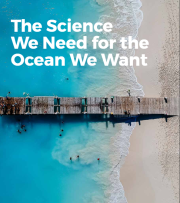More than thirty experts from the South China Sea (SCS) neighboring countries, Japan, Russia, UK and CLIVAR gathered in Putrajaya, Malaysia, 7-8 May 2018 in an effort to draw up a road map for a joint comparative study on upwelling systems in the wider SCS region. This WESTPAC inception workshop on upwelling is hosted and generously supported by the Universiti Malaysia Terengganu (UMT) through its Institute of Oceanography and Environment (INOS).
Upwelling is an important process that brings up cold, nutrient rich water from the deep to the surface when winds blow across the ocean surface. Upwelling regions are some of the most productive ecosystems in the world and support many of the world’s most important fisheries.
“The unique geological and physical settings of the South China Sea and its adjacent regions allow many sites to become upwelling favorable during different monsoon seasons,” Mohd Fadzil Mohd Akhir, WESTPAC Principal Investigator said “Recent study discovered a few upwelling areas within SCS which had never been studied before. There are many other sites which are believed to have similar upwelling dynamics, but they either have not been discovered or not well explored.”
Lively discussions prevailed throughout the two-day workshop. Besides sharing current global upwelling programmes and activities, experts in various disciplines and programmes exchanged their knowledge and latest scientific findings on upwelling systems in the Western Pacific, in particular SCS region. The importance of a multidisciplinary approach was unanimously stressed, with a view to transforming the knowledge on upwelling systems, elucidating their ecological, and economic impacts towards an ecosystem based management.
Wenxi Zhu, Head of the WESTPAC Office, called for an enhanced cooperation among countries. “ A lot has been done! And yet, there is still a lot to do,” he said, “this project presents an remarkable opportunity for marine scientific communities to empower decision makers and general public with scientific solutions.”
The workshop concluded with a substantial action plan. In addition to furthering an in-depth review on current upwelling systems in the region and their ecological and economic impacts, experts agreed to concert their efforts in conducting a comparative study on several pilot upwelling regions, which include the north South China Sea, the central coast of Vietnam, the east coast of Peninsular Malaysia and northwest coast of Borneo, the south coast of Java and west coast of Sumatra, and the central west coast of the Gulf of Thailand. Meanwhile, further exploration will be conducted on other potential upwelling regions.
Experts recognized the importance of developing capacity of early career scientists for upwelling studies, and thus identified several training opportunities which could be integrated into the development of this upwelling program, including the INOS’s regular training on data analysis and integration and Indonesian’s techniques on mapping fishing grounds.
“This WESTPAC upwelling workshop truly marks the establishment of a multidisciplinary research network for upwelling systems in the Western Pacific and its adjacent regions,” congratulated by Prof. Dato’ Dr. Nor Aieni binti Haji Mokhtar, Vice Chancellor of Universiti Malaysia Terengganu (UMT), at the opening ceremony.
This workshop on upwelling is an initial effort of the Sub-Commission together with INOS, UMT. The Sub-Commission would extend its greatest thanks to INOS, UMT for its tremendous efforts in making this event possible.




